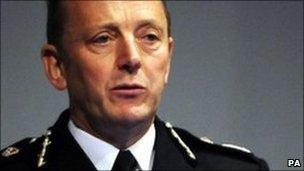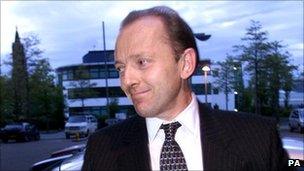Profile: Sir Hugh Orde
- Published

Sir Hugh Orde is a graduate of the FBI's National Executive Institute
Association of Chief Police Officers president Sir Hugh Orde has been seen as a leading contender to become the next Metropolitan police commissioner.
Sir Hugh is widely respected in police circles for his no nonsense approach to policing and his experience in Northern Ireland. He is seen as a commanding figure who has authority.
Police sources say he also has a very good working relationship with the Home Secretary, Theresa May, who has a pivotal role in the appointment of the next Met Commissioner.
But Sir Hugh's contradiction on Newsnight of Theresa May's assertion that politicians were responsible for a change in police tactics when dealing with London rioters - and his frustration that the Government has apparently taken the credit for restoring order - have raised doubts as to whether he would get the job.
The senior officer said politicians flying back from their holidays were an "irrelevance" when it came to the shift in the police's approach.
Sir Hugh has also spoken out against the government's budget cuts, saying key policing areas will be left with a £50m shortfall by 2014-15 which will have to be met by local forces.
Hat in the ring?
The Met has been advertising for a new commissioner since the resignation of Sir Paul Stephenson in July 2011.
Sir Hugh had narrowly missed out on the position when Sir Paul was appointed in 2009. But his current position as chief constable and president of the Association of Chief Police Officers (Acpo), gives him a high profile, good contacts and an excellent insight into the issues facing the Met and other forces up and down the country.
Asked in July if he would be applying, Sir Hugh said: "I haven't finally made up my mind whether to put my hat in the ring, but I note that the mayor (Boris Johnson) is on record as saying that he is ideally looking for a woman to do the job… and that is something that anyone interested in the job has to think about before they decide whether to go for it."
Early career
Sir Hugh Orde began his policing career with the Metropolitan Police in 1977, initially serving in central London.
When he was posted to Brixton as a sergeant, he got his first taste of the challenges of policing in communities where officers do not have the trust of some residents.
He was soon marked out as a high-flyer and given a number of key positions in the Met, leading to management of major crime investigations across the south-west of the capital.
During the 1990s he developed the Met's community and race relations training programmes.
In 1998 he became commander for crime in south-west London. The following year he was the officer in charge of the aftermath of the Brixton bomb, planted by David Copeland, a man consumed by racial hatred.
During this period he developed Operation Trident, one of the capital's most important continuing strategies which targets drugs-related gun crime occurring in black communities.
This led to him working in both Jamaica and South Africa where police forces have been developing similar strategies on organised crime.
Sir Hugh became a deputy assistant commissioner of the Met in 1999 and is a graduate of the FBI's top-flight National Executive Institute.
Northern Ireland
It was his promotion to the higher ranks of the Met that led to his involvement in Northern Ireland.

Sir Hugh Orde arrives at the Northern Ireland Policing Board after being appointed Chief Constable of the Police Service of Northern Ireland in 2002
The then Met commissioner, Sir John Stevens, was investigating allegations of collusion between loyalist paramilitaries and elements of the security forces.
Sir Hugh had day-to-day responsibility for this crucial investigation into a dark episode in the history of The Troubles.
The job meant handling not just a potentially explosive inquiry - but also attempting to keep current officers on board, while reaching out to Nationalists demanding answers.
That work led directly in 2002 to Sir Hugh's appointment as chief constable with responsibility for continuing the police reforms.
During his seven-year tenure, he oversaw the challenge of reforming the force and winning the support of Catholics and Irish nationalists in the wake of the Good Friday Agreement.
Violence and sectarian tension fell massively in Northern Ireland during his time, although critics might argue this was due to political and social factors as much as to police tactics.
Acpo president
Sir Hugh Orde was appointed chief constable and president of the Association of Chief Police Officers in April 2009. Acpo represents the views of 334 senior police officers from England, Wales and Northern Ireland.
During his time in the position, Sir Hugh has advocated amalgamating police forces to save money and has spoken out against the government's plans to introduce elected commissioners.
Elections for the first commissioners, with the power to hire and fire chief constables, are planned for May 2012.
Sir Hugh has also been a critic of cuts to policing funding since they were flagged by the Conservative Party in the run-up to the 2010 election. A 20% reduction in funding is set to come into force by 2014-15.
Sir Hugh has endeared himself to ordinary police officers with his remarks on government pay reforms. He can be very blunt and seldom minces his words.
The question might be whether he is too outspoken to get the job of commissioner, which relies on discretion and a fair amount of "biting your lip".
- Published12 August 2011
- Published17 August 2011
- Published4 July 2011
- Published19 October 2010